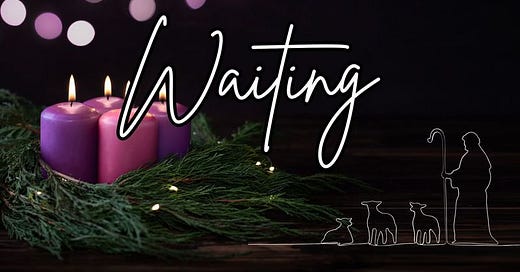It is a story that has resonated with me throughout this Advent season. A country ruled by a colonial power culture that is plagued with prejudice and political corruption. Economic strife and an over taxed social setting that is creating desperation and poverty. And a religious governing subculture feuding with extremist beliefs and zealous movements. In the midst of it all, Zechariah is told, “Your wife Elizabeth will bear you a son, and you will name him John.”1
Maybe it was his old age, or maybe just a cynicism that was plaguing his soul with all that was happening around him; but Zechariah just could not bring himself to believe the words this angel was saying to him. “How will I know that this is so?”2 He asks with a heavy voice. The angel, disappointed with his doubt, tells him he will be unable to speak again until his son is about to be born. Zechariah found himself without words and spent the next nine months in a deep state of silence.
Silence. I too find myself drawn into this state; the state of being without words. After the last year I find myself in almost disbelief to:
the ravaging machine of war robbing the world of life and dignity to the whole of humanity.
political leadership wrapped in corrupt controversy after controversy.
Crumbling healthcare systems that allow ablism and capitalist privatization to direct neglect to the disabled and marginalized communities.
Chaotic social movements that blur, pervert, and decay any sense of meaning to an understandable truth.
On a personal level, I have struggled to find a significance to what I might actually share or contribute to in the world that would actually be of any value. The internal wrestling with that same question of hope, “How will I know that this is so?” I'm sure some of you might refute this and try to bring me some encouragement. For that, I am truly thankful. But the internal battle is one I know I must face on my own and depending on the moment, some days I find myself winning while others, not so much.
In an Advent reflection post of his own, Jonathan Puddle shared that,
“During these days of Advent, we might look back on the year and be honest that it was with much bitterness that we drew water from other wells: the well of self-preservation, the well of control, the well of unjust systems.
But God understands the world we live in, what we are facing and the ways we try to survive it. Advent offers us a road into the mystery of one who sees us and knows us and loves us, and invites us to a hearth & home that is truly safe.”3
Perhaps this post might read as a bit dark. And perhaps it is. But sometimes, it is in the darkness and silence that our other senses begin to see deeper wisdom and truths that we could not see before. We cannot confront the needs for transformation in our lives if we aren’t willing to enter the darknesses of our soul where they reside.
Perhaps… that is the Advent story itself. A God, who after centuries of being silent, is willing to give in to his own creation by entering into the depths of its darkness and finding incarnation as his greatest act of salvational glory.
Micha Boyett speaks of hope locked in a tension between these two realities:
“Sometimes hope looks like preparing the way, and sometimes it looks like sitting in front of the Christmas tree reminding yourself that Advent is, as Rutledge writes, ‘the paradoxical combination of waiting and hastening, suffering and joy, judgment and deliverance, apocalyptic woe and eschatological hope.’”4
So here I wait in reflective silence this Advent season. Maybe you might like to sit with me as together we look towards a coming hope. A hope that may sometimes be hard to see; but promised by Emmanuel, the incarnated one who sits beside us, knows us, and loves us.
Grief anchors love
Setting it correctly
On its heights and
Carving out its depths
Hope stands up to
despair’s flooding
Buoys us, giving us
Safety from the sweeping flow
Anger guards pain
Which alone is weak
But can be hidden
Guarded, fortified
Joy waits for a window
To spill from its well
Full of buckling laughter
And bright new mornings5
The Holy Bible: New Revised Standard Version (Lk 1:13). (1989). Thomas Nelson Publishers.
The Holy Bible: New Revised Standard Version (Lk 1:18). (1989). Thomas Nelson Publishers.
Found in an Advent Post on New Leaf Network by Rachel Pipher — https://www.newleafnetwork.ca/articles/2024-third-tuesday-of-advent






